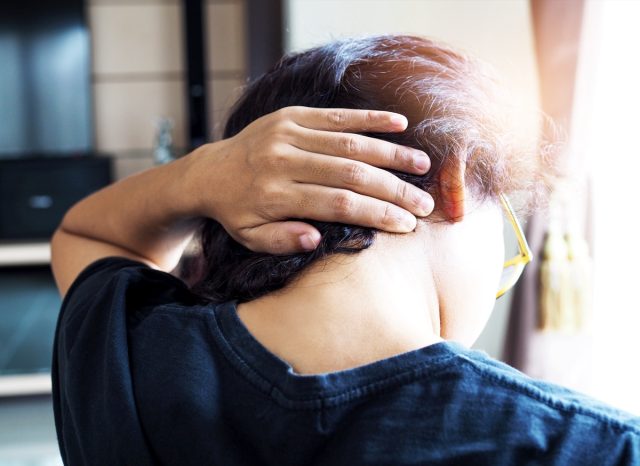Here's What Psoriasis Feels Like, Say Physicians — Eat This Not That - Eat This, Not That
Psoriasis is a long-term skin condition that causes itchy red patches on certain areas of the body. Triggers like stress, illness and weather can cause flare-ups that can last up to months. While psoriasis isn't deadly, it can severely affect a person's wellbeing and cause mental and emotional anguish. Eat This, Not That! Health spoke with experts who explain what psoriasis feels like, how it can affect daily life and course of treatments. Read on—and to ensure your health and the health of others, don't miss these Sure Signs You've Already Had COVID.

Family practitioner, Dr. Janice Johnston, MD, Chief Medical Officer & Co-Founder at Redirect Health explains, "Psoriasis is a common and chronic autoimmune condition that is triggered by infection, stress and cold weather, affecting more than 7.5 million adults in the U.S. This skin disease can cause patches of itchy, red and scaly skin to appear on various areas of the body, including the knees, elbows, chest and scalp. Inflammation is common and it is possible for the skin to crack and bleed. While it can't be cured, treatment can help alleviate symptoms. There are multiple types of psoriasis, including plaque, guttate, pustular, inverse and erythrodermic."
Dr. Jeffery Hsu, M.D., FAAD, Founder of Oak Dermatology shares, "Psoriasis is a common skin disorder, affecting approximately 3% of the US adult population. Generally psoriasis manifests as red, itchy, scaly plaques. Sometimes it can be mistaken as rashes or eczema unless a patient is examined by a dermatologist. Unfortunately, psoriasis is a chronic condition with periods of remission. Psoriasis can appear on various body parts: scalp, nail, groin, with extremities and trunk being the most common."

Dr. Johnston emphasizes, "Psoriasis is not contagious, so it is not caused by contact with other people who suffer from the disease. Scientists are unsure of the exact causes of psoriasis, but they know the immune system and genetics are factors that can contribute to the disease. The genetic risk factors of psoriasis are complicated, and it is possible to develop it even if no one else in the family has it. Psoriasis can be triggered by events such as stress, injury to skin, cold weather and possibly allergies. When psoriasis is triggered, it means that the skin production process is accelerated, causing a rapid overproduction of skin cells and leading to build up."

Dr. Johnston says, "Among different racial groups, Caucasian individuals are more at risk of developing psoriasis. Additionally, since the disease can be genetic, if both parents have psoriasis the child can have a 50 percent chance of developing the disease. Smoking and alcohol have also been associated with the risk of developing psoriasis. Psoriasis can develop at any age, but those aged between 15 and 25 are most at risk. Psoriasis is common and despite the known risk factors, anyone is at risk of developing this disease during their lifetime."
RELATED: I'm an M.D. and This is the #1 Sign You Have a Heart Problem

"According to those with psoriasis, the disease affects more than just their physical wellbeing," Dr. Johnston shares. "Many patients living with psoriasis say the disease takes a severe toll on their confidence levels. While the disease is not contagious, patients reflect on times when people were afraid to touch them. Without treatment, patients say they can lose sleep over the discomfort and extreme itchiness. It can also cause pain and a burning sensation. The risk of the patches cracking and bleeding is also a source of severe discomfort."
Dr. Hsu adds, "Patients complain of chronic itchy red patches with thick scales, typically on the scalp, knees, and elbows. It can become more severe at times of stress or during cold winters. It can become painful at times."
RELATED: Habits Secretly Increasing Your Blood Clot Risk, Say Physicians

Dr. Johnston says, "Psoriasis affects both mental and physical health. Studies have linked psoriasis with depression and suicidal tendencies due to feelings of isolation. Those with psoriasis may also be at an increased risk for diabetes and heart disease."
Dr. Hsu emphasizes, "Psoriasis is not a fatal disease and does not affect survival. But not only is the rash symptomatic, causing itch and sometimes pain, the appearance of these lesions can be stigmatizing, which in turn causes anxiety, stress or even depression."
RELATED: Dr. Fauci Just Warned of "Increase in Cases" in Next Weeks

"Psoriasis has no permanent cure, but treatments that exist help reduce symptoms and the speed at which skin cells grow," says Dr. Johnston. "Options for treatment include light therapy (phototherapy) and ointments or creams. Ointments and creams include corticosteroids such as hydrocortisone cream. This cream works as a temporary solution to stop itching. However, over time, these creams may stop working. Light therapy can treat mild to severe psoriasis by exposing the skin to controlled amounts of natural or artificial light. Oral medication may also work, but has risks of severe side effects. Individuals should discuss with their doctor to determine the best treatment for psoriasis for them. The newest forms of treatments are called biologics which are given by injection. They act to suppress the immune system and can have remarkable improvement in the skin appearance. Biologic medications are quite expensive however and can be associated with increased risk of infections." And to protect your life and the lives of others, don't visit any of these 35 Places You're Most Likely to Catch COVID.
Comments
Post a Comment